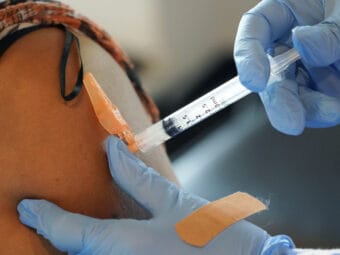Updated Post – 9:00 p.m.
Alaska will become the first state in the country to open COVID-19 vaccinations to anyone 16 and older, officials announced Tuesday, capping a swift rollout of the shots that’s seen a boost from tens of thousands of extra doses shipped to and administered by tribal health care providers.
Gov. Mike Dunleavy announced the expanded eligibility in a prepared statement Tuesday afternoon.
“Alaska has led in many, many categories in dealing with this virus,” Dunleavy said during a press briefing following the announcement. “This is an opportunity for Alaska to lead again.”
Health officials in previous days had hinted that they might take such a step, suggesting that vaccine hesitancy and confusion about previously broadened eligibility guidelines were leaving appointments unfilled across the state.
Alaska’s state-sponsored distribution effort has seen a major boost from its tribal health care partners, which have been allotted separate shipments of vaccine through a unique partnership with the federal government — aimed at recognizing both tribes’ sovereign status and COVID-19’s disproportionate impact on Alaska Native people.
“I think it’s a combination of the fact that we’re going to get more vaccines, that we have, I think, a number of effective systems in place: Indian Health Service, Alaska Native health services; our municipality partners; our business partners; the state system itself. I think it all works pretty well together,” Dunleavy said.
Up until last week, the state limited vaccinations to front-line health care workers, teachers, and people aged 50 and older who worked in certain front-line essential positions or suffered from certain pre-existing health conditions.
But last week, buoyed by a major boost in the number of shots being shipped to the state, officials announced that vaccinations would open to a far broader group: all essential workers, anyone 55 and over and anyone with a health condition that could put them at high risk of serious illness from COVID-19.
Dunleavy described his recent experience of becoming with sick with COVID-19 as an “inconvenience.” He urged those considering whether to be vaccinated to consider the effect on their families if they become ill. While he repeatedly said he respects those who don’t want to be vaccinated, he says he will get the vaccine.
“I’m doing that because I don’t want to be a burden on the hospital system. I don’t want to be a burden on my family. I don’t want to be taken out of operation for a while,” he said.
He says that if Alaska reaches herd immunity, it will help Alaskans’ lives and the economy.
“We’re hoping that we can get the cruise ships back here, the tourism industry back here,” he said. “We’re hoping that we can get Alaskans out working together and building Alaska this summer, mixing and mingling.”
Vaccine appointments will be open to anyone 16 and over, although 16- and 17-year-olds will only be eligible for the vaccine manufactured by drug company Pfizer, as the two other vaccines on the market are only authorized for people 18 and older.
Alaska Chief Medical Officer Doctor Anne Zink talked about how Alaska can protect its youngest residents. She said adults need to do their part by getting their shots.
“Kids are part of our herd and kids can’t be vaccinated as of right now,” she said. “And as a result, we need a lot more adults to make the decision to be adults and to do what they can to be able to vaccinate and to protect our kids in general.”
She also said people being vaccinated is the fastest way to open up the economy and communities.
“This is our shot to end this pandemic,” she said.
She said it looks like the state and Indian Health Service allocations of vaccines will be well over 100,000 in the next month. That number doesn’t include the amounts received by federally qualified health centers and some pharmacies, as well as the military and Veterans Administration.
Alaska has provided the most COVID-19 shots per resident of any state. And it has the highest share of its population that’s fully vaccinated — 23.6% of residents have received one shot and 16.4% are fully vaccinated.
But there is a long way to go before Alaska reaches the roughly 75% to 85% of the population with immunity that scientists estimate will prevent the spread of the disease.
Dunleavy says he hopes people will look back at Alaskans’ response to the pandemic as positive. He imagined a possible future narrative:
“Alaska, a lonely outpost, way in the northwest part of North America, which it is pretty easy for Washington, D.C., and other places to forget — we rolled up our sleeves, we worked together. We put aside politics. We put aside a whole host of things that we often times squabble about,” he said.
But he added that while the expanded eligibility could give the state a boost toward that goal, the response is not over.
This story was updated to include comments from Gov. Dunleavy and Dr. Anne Zink from the Tuesday evening press briefing. Alaska Public Media reporter Nat Herz contributed to this story.
Original post — 4:00 p.m.
Gov. Mike Dunleavy will be holding a press conference from Juneau at 5 p.m. He will be joined by Dr. Anne Zink, the state’s chief medical officer, and public health director Heidi Hedberg.
The administration will be giving an update on COVID-19 in Alaska.
Alaska has one of the highest vaccination rates in the country, and the state’s vaccination allotment is expected to nearly double later this month.
Last week, the state expanded vaccine eligibility to all Alaskans age 55 and older, essential workers and other groups. But many appointments remain unfilled.
You can stream the governor’s press conference here or on Gov. Dunleavy’s Facebook page.



